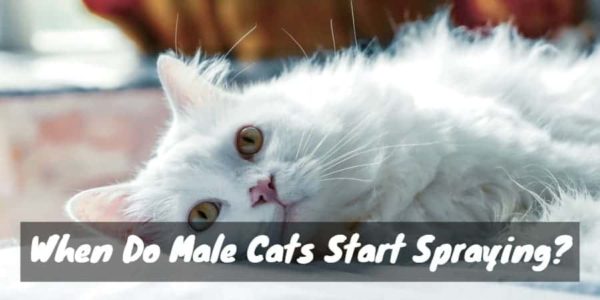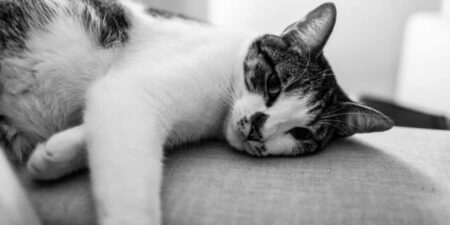It’s an issue that you’ll inevitably face if you own an unneutered male cat: eventually, he will start spraying. You’ll arrive home and smell it before you even walk in. Then you’ll survey the damages and find it everywhere – the walls, the couch, your bed, anything the cat could reach.
Regular cat urine is unpleasant enough as it is, but spraying goes above and beyond the normal level of nastiness. It smells far stronger than everyday cat urine and gets deposited pretty much everywhere. Even the most perfectly potty trained cat won’t limit his spraying to the litter box; everything’s a target when he wants to spray.
[amazon bestseller=”cat automatic litter box”]
So what exactly is spraying? Why do cats do it and when do they start doing it? Let’s find out the answers to these questions – and learn what we can do to control and prevent this behavior.
The Secret Language: How Cats Communicate Through Scent

Unseen Messages
Cats communicate with each other through vocalizations and body language just like humans do. Unlike humans, however, much of cat communication occurs through scent. We can’t see or hear it, so it’s not always obvious, but if there’s a cat around, you can bet it’s leaving scented messages everywhere it goes.
Cats communicate with each other through vocalizations and body language just like humans do. Unlike humans, however, much of cat communication occurs through scent. We can’t see or hear it, so it’s not always obvious, but if there’s a cat around, you can bet it’s leaving scented messages everywhere it goes.
A cat’s nose contains over 200 million scent receptors, compared to our 5 million, so it’s only natural that smells play a much bigger role in its life than they do in ours. Sure, we communicate some things through scent – we use perfumes and colognes to make ourselves more appealing to others, and we employ scented oils and candles for various psychological effects – but cats have an entire language centered around odors.
Grand Glands
It’s hard to say just how much of cat communication is carried out through scent, but it’s important enough that cats may spend hours applying and reapplying scent markings to just about everything they can reach. They do this by rubbing their heads, paws, sides and tails against objects, people and other animals. The pressure activates special glands, which then deposit various scents, called pheromones.
Most people think of pheromones as hormones that signal an animal’s readiness to mate, and while that’s one purpose they serve, cats produce many different pheromones that each have their own uses. The glands found in the forehead contain feline facial pheromones, which have a calming, comforting effect. When cats headbutt each other – or you – they exchange these pheromones as a sign of friendliness, boosting each other’s moods both psychologically and physiologically.
Paw pheromones are more informational in nature, carrying basic facts about the cat such as its age, health and sex. When cats scratch at things, they leave these pheromones behind as calling cards. The next cat that comes along can give it a whiff and learn more about the previous visitor.
[amazon bestseller=”cat hair remover”]
The tail and flanks are home to glands that produce more territorial pheromones. Head pheromones also carry territorial signals, but they tend to be much friendlier in nature than those produced towards the back of the cat. When a cat rubs its sides and tail against something, it’s definitively claiming the object as its property, and the scent it leaves behind tells unfamiliar cats to back off.
Sending Out Signals: Why Cats Spray
Regular cat urine does contain some information about its producer encoded within its scent, but sprayed urine is laden with so many pheromones that even we, with our comparatively pitiful noses, can smell the difference. The pheromones excreted in urine are ultra concentrated, designed to be as pungent as possible in order to last longer and be detected from further away.
Cats need to pee regardless of whether or not they have anything to communicate at the time, but spraying is done with intent and conveys one or more of the following messages.
Ready to Mate
Sexually mature male cats who haven’t been neutered want the world to know that they’re single and ready to mingle. They accomplish this by spraying anything and everything they can, hoping to create such a powerful scent that every female cat for miles around will know where to find them. The urine is loaded with the cat’s sexual pheromones, which contain information about his age and health as well as the unmistakable message that he’s looking for love.
Female cats that haven’t been spayed may also spray to indicate their sexual readiness, but unlike male cats, they’re only able to mate for a few days at a time. The pheromones in a female cat’s spray communicate information about where she’s at in her reproductive cycle, regardless of whether she’s in heat or not, so spraying doesn’t mean for sure that she’s ready to mate. Not all intact females spray, either – in fact, most never spray for any reason, sexual or not.
Marking My Turf
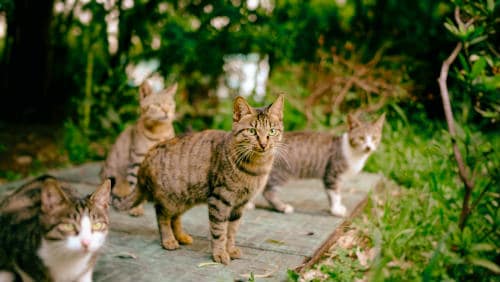
Territorial pheromones are excreted through urine just like sexual pheromones. When male cats spray, they often release both at the same time, as the messages share a common goal: attracting females and warding off other males. Fewer males mean fewer competitors for a mate, so they spray in hopes of scaring other potential suitors away while still luring in the ladies.
Claiming territory is important for all cats – most are happy to share with others as long as they’re friendly and respectful, but every cat likes to have a little space of its own. Most of the time, territorial marking is accomplished by rubbing, but intact males in particular have a very strong desire to claim as much as they can for their exclusive use. In these cases, rubbing alone won’t cut it, so the cats bring out their most powerful weapon: super strong spray pheromones.
Outdoors in particular, intact males go wild with territorial spraying. The stench can permeate entire neighborhoods as the cat goes from door to door marking anything that isn’t claimed, and sometimes taking over other cats’ turf. This is likely to start fights, as cats don’t take kindly to trespassers, especially when they ignore clearly-sprayed messages to back off.
Territorial spraying occurs indoors too, especially in multi-cat households and when cats are not allowed outside. The purpose is the same as outdoor territorial spraying, but it’s not as effective (other cats probably can’t get inside anyway) and far more bothersome to humans. This type of spraying is often done around the perimeter of the house, with corners, drapes and upholstered furniture being the most common targets.
Male and female cats alike can display territorial spraying whether they’re neutered or not, but intact males are by far the most common perpetrators of the behavior. Most female cats and most fixed cats of either sex will never mark their territories by spraying.
[amazon bestseller=”cat spray repellant”]
Stressed Out
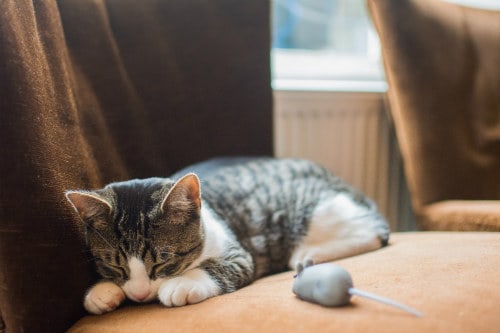
The laid-back feline lifestyle may seem peachy from our perspectives, but lots of things can stress a cat out. Sometimes when we get stressed out, we express it in ways that are cathartic but ultimately unhelpful or unpleasant to others. Cats do the same thing – sometimes stress relief is just a nap away, but other times they opt for a bolder coping mechanism: spraying.
Various stressors can provoke a spraying session, but most of them involve the cat feeling that its territory is under threat. The arrival of a new cat in the neighborhood may cause your cat to stare out the window at it for hours and then circumnavigate the house, spraying everything in its wake. Moving to a new home can have the same effect.
In these situations, the cat feels like the only thing it can do to ensure its security and maintain its claim on its turf is spray. If allowed to continue for long enough, it may become a compulsive behavior; the cat becomes so reliant on spraying to relieve its stress that it can conceive of no other way to alleviate anxiety.
Stress-related spraying may even contain familiarity pheromones in addition to territorial ones. By spraying and releasing these scents, the cat is able to calm down by smelling itself and finding comfort in the familiarity. This may help in the moment, but in the long term it can turn spraying into a bad habit. The prospect of instant stress relief is very tempting and an anxious cat may not be able to resist.
Coming of Age: When Do Cats Start Spraying?
Both male and female cats will begin spraying when they reach sexual maturity, which usually occurs at around six months of age. At this age, cats are analogous to human teenagers: they’re in an awkward stage and hormones are running high. They may begin acting out in a number of different ways, from destroying things and getting in fights to sneaking out and, yes, spraying everything.
If cats are spayed or neutered before reaching sexual maturity, they will almost certainly never spray anything. Because they never experience the flood of hormones associated with puberty, they never feel the drive to mate, and their territorial urges are often greatly reduced as well. With the two main reasons for spraying eliminated, these cats usually go their entire lives without ever spraying.
Cats that are spayed or neutered after reaching sexual maturity are slightly more likely to spray after being fixed, though they still rarely do so. For males in particular, spraying can be a habitual behavior, and a male cat may continue to spray periodically for some time after being neutered. Usually, though, they figure out pretty quickly that spraying just doesn’t bring about the same satisfaction that it used to, and cease the behavior before long.
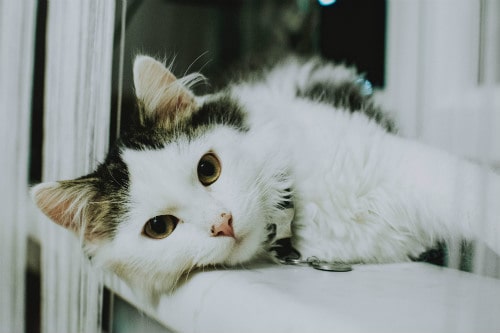
Though female cats that haven’t been spayed may spray at times, most of them don’t ever engage in this behavior, and those that do spray much less frequently than unneutered males. Intact male cats are by far the biggest perpetrators of all types of spraying. If you have a male cat who isn’t neutered, he’s just about guaranteed to spray at least once in a while, so you’ll have to be prepared to deal with the cleanup.
[amazon bestseller=”Cat Spray Remover”]
Enough Is Enough: How to Stop Cats from Spraying
If you’re fed up with your cat’s spraying, there are ways to reduce the behavior or stop it altogether. Early intervention produces the best results, so it’s important to begin dealing with the problem as soon as it arises.
Spaying and Neutering
The most effective way to reduce or stop spraying is to spay or neuter the cat. It’s preferable to do this before the cat reaches sexual maturity, but even if the cat is past six months of age, getting it fixed will do wonders for the spraying problem.
Spaying and neutering prevent the cat from reproducing in the future, but these procedures have a number of other beneficial effects beyond stopping spraying. Once fixed, cats display far fewer aggressive tendencies, particularly males. Females won’t go into heat, which eliminates the restlessness and noisiness that are symptomatic of her desire to mate.
Reduce Stress
It’s frustrating to deal with your cat spraying everything day after day, but your reaction could be making the problem worse. Stressed-out cats spray more than relaxed cats, so if you react with anger, you could actually be making the cat more likely to spray. No amount of scolding or discipline will stop your cat from spraying – it’s an instinctual, natural behavior that often can’t be controlled.
If your cat is spraying, show it a little sympathy. Examine the environment and try to determine if anything is stressing the cat out. Maybe some of the other neighborhood cats are visible through a window that can be blocked off, or perhaps you’ve been having a lot of new people over recently and the cat is overwhelmed.
Fight Pheromones with Pheromones
We know that some pheromones rile cats up, but there are others that have the opposite effect, inducing a state of calm and relaxation when smelled. Cats produce these naturally, but if your cat is spraying a lot, it may not be making enough of these chill-out compounds on its own.
[amazon bestseller=”cats wet food”]
Some owners of spray-happy cats report success with commercially available pheromone sprays. These contain synthetic versions of the calming pheromones made by happy, relaxed cats. Many cats can’t seem to tell the difference between these pheromones and natural ones, and they begin to calm down as soon as they catch a whiff.
"In ancient times cats were worshipped as gods; they have not forgotten this."
-- Terry Pratchett

